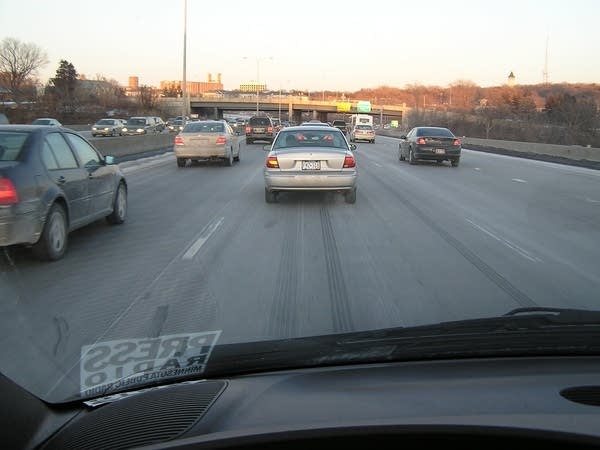Rules of the road could get tougher

(AP) - Strap in the kids, buckle up and turn off the cell phone. The rules of the road in Minnesota might get more strict in 2007.
In the name of highway safety, lawmakers are debating bills to increase the use of seat belts and child booster seats and cut down on behind-the-wheel phone calls.
To pressure drivers into compliance, the tougher laws come with added fines. The way cell phone bill sponsor Sen. Scott Dibble sees it, "you are posing more risk, so you need to take on more risk."
The proposals are zooming through the Legislature with more momentum than in the past to the dismay of people who view them as an overreach by state government.
Create a More Connected Minnesota
MPR News is your trusted resource for the news you need. With your support, MPR News brings accessible, courageous journalism and authentic conversation to everyone - free of paywalls and barriers. Your gift makes a difference.
On Tuesday, the Senate Transportation Committee approved a bill requiring drivers to put passengers younger than 8 years old in booster seats or use other approved child restraints.
The same panel endorsed legislation piling on more fines for drivers who break traffic laws while on the phone.
[With] these sort of good-for-you government proposals ... you move toward a world where the government intrudes upon every aspect of your life. At what point are you not OK with that?"
Meanwhile, four committees have signed off on a separate plan giving police power to stop cars if they spot unbelted drivers or passengers and impose $25 fines for each unbuckled rider.
Under current law, police must have another reason to pull a car over before issuing a seat belt citation.
The general thrust of the bills is disconcerting to Chuck Samuelson at the American Civil Liberties Union of Minnesota.
"You can't argue with each of them individually. But taken in total these sort of good-for-you government proposals, you can get concerned," Samuelson said. "You move toward a world where the government intrudes upon every aspect of your life. At what point are you not OK with that?"
The safety restraint measures are designed to minimize injury from crashes; sponsors of the cell phone bill say it could prevent accidents in the first place by reducing a common driver distraction.
"It's a risk that's comparable to driving while sleepy and driving while drunk," said Dibble, DFL-Minneapolis. "It's obvious it's time to act."
Minnesota already prohibits cell phone use by drivers younger than 18, but Dibble avoided seeking an all-out ban for adults. He said he doubts such a ban could pass.
Drivers can keep dialing -- but at their own risk. Police would be able to double the fine for speeding or another moving violation if a cell phone is being used at the time of the offense. That could raise the cost of some tickets to $250, the bill's backers said.
Some lawmakers argue that the proposed law would be hard to enforce. Sen. Rod Skoe, DFL-Clearbrook, said drivers would have a simple defense mechanism: "If you have an accident, you just hang up."
The bill doesn't distinguish between hands-free and hand-held devices, which drew objections from a Verizon Wireless lobbyist. But it makes exceptions for certain emergency calls.
The booster-seat proposal would raise the required age for child safety restraints from 4 years old and under to 8 and under -- regardless of height and weight.
Supporters said Minnesota hasn't had a meaningful update to its law since 1982. They said some children are using belts that don't cover the right area of their torso, affording them less protection in crashes.
"Seat belts, unfortunately, weren't designed for kids. They were designed for adults," said Dr. Tom Hellmich of Minnesota's chapter of the American Academy of Pediatrics. "That's the problem."
Drivers who fail to use a special safety device for their young child would face a fine of up to $50.
Sen. Julianne Ortman, R-Chanhassen, questioned whether age was the right measure.
"There are drivers the same size as my 8-year-old son," Ortman said.
(Copyright 2007 by The Associated Press. All Rights Reserved.)
